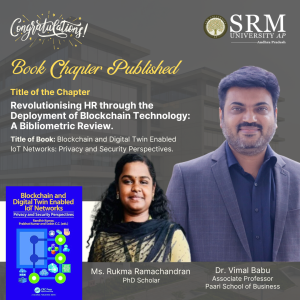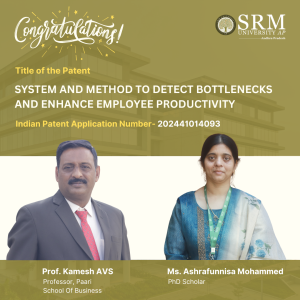Current Happenings
- Innovating Human Resources: A Blockchain Technology Bibliometric Analysis July 2, 2024
 In a significant academic achievement, Dr Vimal Babu, Associate Professor at the Department of Management, Paari School of Business, and Ms Rukma Ramachandran, a PhD Scholar, have co-authored a book chapter titled “Revolutionizing HR through the Deployment of Blockchain Technology: A Bibliometric Review.” The chapter is included in the book Blockchain and Digital Twin Enabled IoT Networks: Privacy and Security Perspectives, published by Routledge: A Taylor and Francis Group.
In a significant academic achievement, Dr Vimal Babu, Associate Professor at the Department of Management, Paari School of Business, and Ms Rukma Ramachandran, a PhD Scholar, have co-authored a book chapter titled “Revolutionizing HR through the Deployment of Blockchain Technology: A Bibliometric Review.” The chapter is included in the book Blockchain and Digital Twin Enabled IoT Networks: Privacy and Security Perspectives, published by Routledge: A Taylor and Francis Group.
The research work delves into the potential of blockchain technology in transforming Human Resources practices, offering a bibliometric review to shed light on the impact and future possibilities within the field.The publication adds valuable insights to the growing discourse on blockchain applications in various industries, particularly focusing on HR management. This collaborative effort between Dr Vimal Babu and Ms Rukma Ramachandran highlights their dedication to exploring innovative solutions at the intersection of technology and management. Their contribution to the book aims to contribute to the ongoing dialogue on privacy, security, and efficiency in IoT networks, with blockchain technology playing a pivotal role in shaping the digital landscape.
The chapter’s publication signifies a notable milestone in the academic pursuits of both scholars, solidifying their expertise and thought leadership in the realm of blockchain technology and its implications for HR practices. Their contribution is expected to resonate with professionals, researchers, and students interested in the evolving dynamics of digital innovation and its impact on organisational processes.Brief Introduction of the Book Chapter
The adoption and implementation of Blockchain in Management have been gaining increasing attention. The rise in the number of studies on Blockchain in managerial applications invites a greater number of research contributions in this field. This chapter describes the gap in the present studies using a hybrid review system through the means of systematic literature review and bibliometric analysis.Publication details (incl. Publisher, ISBN, Launch date, Edition, etc)
Publisher- Taylor & Francis
ISBN- 9781003403791
Launch date- 19 July 2024
Edition- 1stTarget Audience of the Book Chapter
This book emphasizes and facilitates a greater understanding of various data security privacy approaches using the advances in Blockchain and data analysis using machine/deep learning, federated learning, edge computing and the countermeasures to overcome these vulnerabilities.Link to the Book Chapter
Continue reading →
Blockchain and Digital Twin Enabled IoT Networks | Privacy and Securit (taylorfrancis.com) - Professor and Scholar Duo filed Patent for Employee Productivity Enhancement System June 10, 2024
 In a significant development, Prof. Kamesh AVS, Professor at Paari School of Business, along with his PhD Scholar, Ms. Ashrafunnisa Mohammed, has successfully published and filed a groundbreaking patent titled “SYSTEM AND METHOD TO DETECT BOTTLENECKS AND ENHANCE EMPLOYEE PRODUCTIVITY” with the Application Number: 202441014093 A in the Patent Office Journal.
In a significant development, Prof. Kamesh AVS, Professor at Paari School of Business, along with his PhD Scholar, Ms. Ashrafunnisa Mohammed, has successfully published and filed a groundbreaking patent titled “SYSTEM AND METHOD TO DETECT BOTTLENECKS AND ENHANCE EMPLOYEE PRODUCTIVITY” with the Application Number: 202441014093 A in the Patent Office Journal.This pioneering system aims to revolutionise the way organisations detect and alleviate bottlenecks within their operations, consequently boosting overall employee productivity. The patent’s unique approach and methodology signify a remarkable stride towards fostering efficiency and performance in the workplace. Prof. Kamesh AVS and Ms. Ashrafunnisa Mohammed’s collaborative effort underscores their commitment to innovation and research excellence. Their accomplishment not only reflects their expertise in the field but also highlights the spirit of ingenuity and problem-solving that drives academia at Paari School of Business.
The SRM AP community extends its heartfelt congratulations to Prof. Kamesh AVS and Ms Ashrafunnisa Mohammed on this remarkable achievement and eagerly anticipates the positive impact their invention will have on the realm of employee productivity and operational efficiency.
Abstract of the Research
SYSTEM AND METHOD TO DETECT BOTTLENECKS AND ENHANCE EMPLOYEE PRODUCTIVITY
The present disclosure relates to a system for detecting bottlenecks and enhancing employee productivity. The system broadly includes an input module (106), a pre-processing module (108), a segmentation module (110), a feature selection module (112), a feature extraction module (114), a data training module (116), and a classification module (118). The system also consists of a data repository (102), a processor (104), and an evaluation module (120). The present disclosure aims to examine counterproductive work behaviors of employees through the effort-reward imbalance model by considering dark triad traits as moderators. The dark triad traits can indulge the employees more in unethical practices in organizations and one among those traits is Narcissism which negatively affects counterproductive work behaviors. Organizations can predict the Dark Triad traits in individuals, and they can avoid unethical practices in organizations and counterproductive work behaviors.Explanation of the Research in Layperson’s Terms:
The present process aims to examine counterproductive work behaviors through the effort-reward imbalance model by taking into consideration Dark triad traits as moderators. The Dark Triad traits can indulge the employees more in unethical practices in organizations and one among those traits is Narcissism which negatively affects counterproductive work behaviors. Organizations can predict the Dark Triad traits in individuals, and they can avoid unethical practices in organizations and can avoid counterproductive work behaviors. There is a notable knowledge gap concerning the moderating role of Dark Triad traits in the relationship between efforts and rewards imbalance and counterproductive work behaviors, even though there is existing research on both the association between Dark Triad traits and counterproductive work behaviors and the relationship between efforts and rewards imbalance and counterproductive work behaviors.
Practical Implementation or Social Implications Associated with the Research:
• The Invention aims at identifying and eliminating the consequences of the Dark Triad Traits while performing Human Resources Practices like Recruitment, Training and Development, Performance Analysis, and Compensation and Reward Management system.
• The Invention either weakens or eliminates the Counter Productive work behaviors as a potential consequence of springing up of Dark Triad traits during the execution of various Human Resource practices in the organizations and this leads to achieving the estimated Organizational Productivity as per the strategy.
• Organizations can identify the impact of the Dark triad traits on employees and take steps to reduce the stress that leads to unproductive work behaviors.
• Organizations can eliminate the job stressors which are seen as the main sources of
• Counterproductive work behaviors can indicate the Dark triad traits’ influence on individuals.
• Management should investigate the causes of rudeness in the workplace to improve morale and productivity.
• During the hiring process, management should use a battery of psychological tests to gain insight into candidates’ personalities.
• Management can formulate standard policies to eliminate malicious activities and avoid effort-reward imbalances and counterproductive work behaviors.
• Understanding the causes of counterproductive workplace behavior is vital because it has become a widespread and expensive problem for businesses worldwide.Future Research Plans
Continue reading →
To Incorporate AI and ML tools to identify the Dark Triad traits, thereby enhancing the employee evaluation process and mitigating counterproductive work behaviors within organisations.

